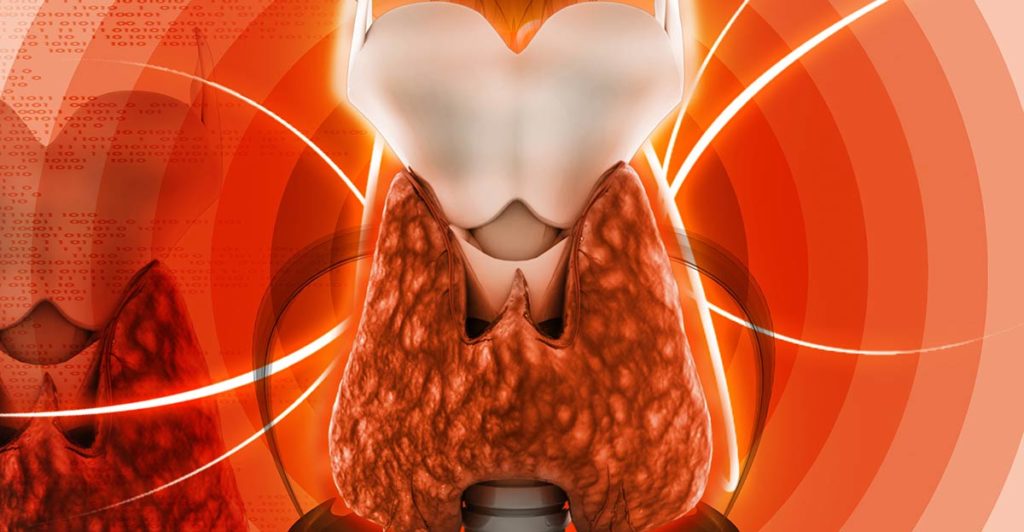Hypothyroidism (underactive thyroid) is a condition in which your thyroid gland does not produce enough of certain essential hormones.
Hypothyroidism may not cause visible symptoms in the early stages. Over time, untreated hypothyroidism can lead to a number of health problems such as obesity, joint pain, infertility and heart disease.
Accurate thyroid function tests are available to diagnose hypothyroidism. Treatment with synthetic thyroid hormone is usually simple, safe and effective, once you and your doctor have found the right dose for you.

The thyroid gland consists of two lobes that resemble the wings of a butterfly. The thyroid is able to absorb iodine from the foods you eat. It is the only gland in your body that can do this. Your thyroid takes iodine and uses it to produce two main hormones, triiodothyronine, also known as T3, and thyroxine, known as T4. It is these hormones that regulate the rate at which your body uses carbohydrates and fats or lipids. The thyroid also helps control body temperature, heart rate, and protein creation. Calcitonin, another hormone made by the thyroid gland, is a hormone that regulates the level of calcium in the blood.
Although we do not have definitive knowledge about the cause of most nodules and their appearance, it has been discovered that there is a certain factor that is associated with their appearance. The list includes :
– A small amount of iodine in the diet
– Hashimoto’s disease, associated with hypothyroidism
– A genetic defect in the receptors responsible for the release of TSH or thyroid stimulating hormone.
– Radiation treatments at an early age, such as in a child’s hood, head or neck area.
Different types of nodule
There are different types of nodules that can develop in the thyroid gland:
Colloidal nodule – The type of nodule is non-cancerous or benign. It appears as an overgrowth of normal thyroid tissue. It is possible to have one or more colloidal nodules. Although it is possible for these nodules to grow larger, they do not spread to other parts of the body and are contained only in the thyroid gland.
Follicular Adenoma – This type of nodule is also non-cancerous or benign.
Thyroid cyst – It can be benign or malignant depending on the type of nodule. These are fluid-filled areas of the thyroid gland that may be different sizes. They can range in size from less than a third of an inch in diameter to more than an inch. Thyroid cysts are usually filled with fluid. Some thyroid cysts have solid components. They are called complex cysts. Fluid-filled cysts are usually benign. Complex cysts can sometimes be malignant.

Inflammatory nodule – This type of nodule can sometimes develop as a result of chronic inflammation of the thyroid. This condition is called thyroiditis. There is a rare form of thyroiditis called subacute thyroiditis, which is accompanied by severe pain in the thyroid gland. There are other types of thyroiditis that are painless and sometimes occur after pregnancy. This is called postpartum thyroiditis.
Thyroid cancer – Nodules are unlikely to be cancerous if a doctor determines that you have it. If you have a family history of thyroid cancer or any other endocrine cancer, you will be more at risk. Similarly, if you are a man under 30 years of age or over 60 years of age, with a history of radiation to your head or neck, you will also be at risk. Cancer nodules are usually large and firm to the touch, often causing discomfort and/or pain in the neck area.
Multinodular goitre – The term “goitre” refers to any enlargement of the thyroid gland. The appearance of several nodules can lead to goitre. This is called multinodular goitre. This condition causes a tightening of the throat accompanied by difficulties in swallowing and breathing.
Hyperfunctional thyroid nodule (toxic adenoma, toxic multinodular goiter, Plummer’s disease) – TSH is released by the pituitary gland, which regulates the production of thyroid hormones. Hyperfunctional thyroid nodules that become larger and actually produce thyroid hormones separate from the influence of TSH or thyroid stimulating hormone. Hyperfunctional thyroid nodules create a situation where there are high levels of thyroxine in the blood accompanied by low or no levels of TSH. A genetic defect in the TSH receptors may be a reason for the overactivity of the nodules.
The risk factors
Thyroid nodules are quite common. In fact, up to 50% of people can have one. The exact cause of thyroid nodules is still unknown, although certain factors seem to increase the risk of having one. These include the following factors:
Heredity – Family history such as the existence of nodules in parents or siblings tends to put an individual at a higher risk of developing nodules.
Age – The risk of developing thyroid nodules increases with age. Changes can occur in your thyroid gland as part of the aging process.
Gender – Statistically, women are more likely to develop thyroid nodules than men.
Radiation exposure – In the 1940s and 1950s, many people were often treated with radiation for non-cancerous conditions, such as acne or enlarged tonsils. If as a child you had this type of treatment or radiation therapy in your neck or head for the conditions mentioned above, you have a higher risk of developing thyroid nodules. You are also at greater risk if you have been exposed to radioactive particles that were in the air during an atomic weapon test or if you have been exposed to radiation from a nuclear power plant accident.
Specific thyroid conditions – If you have had thyroiditis or chronic inflammation of the thyroid gland, this also puts you at greater risk.


